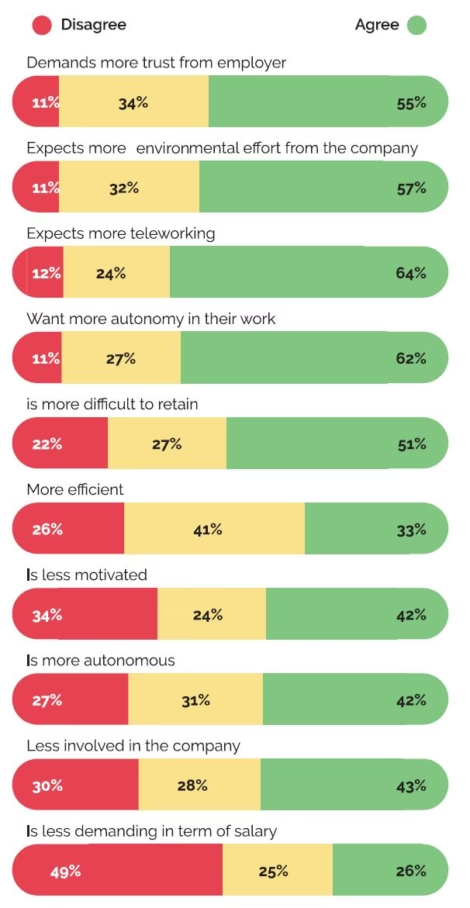We have conducted market research among 1,000 employers in 5 European countries to understand how Generation Z employees are perceived. Discover the results in this article and get the full report on request.
![Generation Z and work: employers’ perceptions [Research]](/blog/app/uploads/generation_y_youngsters.jpg)
Generation Z, made up of people born between 1997 and 2012, is a hot topic among companies. We have conducted a survey of 1,000 employers in 5 European countries to understand their perceptions of GenZ. In this article, we give you a first summary of the findings of this market research. An extract from the Research in PDF format is also available at the end of this article. The complete Research can be obtained free of charge upon request.
Get the full Research free of charge
Generation Z is characterized by specific expectations, such as flexibility, work-life balance, and a quest for meaning in their jobs. Their mastery of digital tools and ability to adapt are major company assets. However, meeting their demands represents a challenge employers must overcome to attract and retain these young talents. This article explores trends, key statistics, and strategies for integrating Generation Z into the world of work.
Key market research figures
- Employers’ perception of Generation Z
- 67% believe that Gen Zer’s want flexible working options
- 57% perceive expectations in terms of responsible environmental practices
- 55% of employers consider this generation more difficult to retain
- 41% of employers surveyed perceive GenZ as less motivated
- General Employment Trends for Generation Z
- 85% of companies surveyed already employ members of Generation Z
- 83% have hired Gen Z talent in the last 12 months
- Employment rates by country
- Germany: 92% of companies surveyed employ members of Generation Z
- France: 88
- Spain: 77%, which is the lowest Gen Z employment rate in our survey
- Influence of company size
- Small companies (< 50 employees): only 54% of companies surveyed had hired Generation Z employees
- Large companies (> 500 employees): 96% employ young people from this generation
- Sectors that employ most Generation Z
- 100%: Information technology (IT), healthcare, skilled trades, and human resources
- Over 90%: Hospitality/tourism (90.91%) and banking/financial services (90%)
- Less than 80%: Education (79.55%) and Energy/Industry (79.07%)
Methodology
We surveyed 1,000 HR managers in companies of all sizes located in 5 countries:
- France
- Italy
- Spain
- Germany
- United Kingdom
The questionnaire was administered online using the CAWI approach. It is, therefore, B2B research.
The Research on Generation Z is part of a larger project called the “HR Barometer.” We felt it appropriate to publish it independently.
49% of employers believe that GenZ has higher salary expectations than employees from other generations.
Employers’ perceptions of Generation Z in the workplace
The 1,000 companies surveyed bring a new perspective to market research on Generation Z. Indeed, most market research has focused on the expectations of employees from this generation. However, the employer’s point of view had been neglected. Generation Z workers must be seen as part of the workforce. These employees, with their specific characteristics, are therefore likely to change the dynamics of human resources. We have sought to capture this perspective through a series of behavioral questions. Some of these questions are outlined below. Feel free to consult the full report to discover the full richness of the analysis.

Answers provided by the 1,000 employers surveyed to the question: “Compared to an employee of the previous generation, an employee of Generation Z is …”
The results reveal a triptych of issues of concern to HR managers. This triptych concerns topics linked to salary expectations, motivation, and loyalty. These 3 topics undoubtedly correlate highly, and employers’ perceptions are clear-cut.
Salary expectations
There is no doubt that GenZ’s salary expectations are perceived as a salient issue by employers. Only 26% perceive their salary expectations as lower. Conversely, 49% of employers believe that GenZ has higher salary expectations than employees from other generations.
The report also highlights interesting differences between countries. In Spain, for example, 60% of employers surveyed believe Generation Z has higher salary expectations than other generations, compared with only 29% in Italy.
Motivation
Generation Z’s motivation at work is a hotly debated topic. Our market research takes a fresh look at the subject and confirms certain fears. Indeed, 41% of employers questioned perceive GenZ as less motivated, and 42% as less involved in the company.
Loyalty
European employers agree on the difficulty of retaining Generation Z. Of the 1,000 employers surveyed, 52% perceive Generation Z as more difficult to retain than previous generations. This figure rises to 65% in France. Italian employers (47%) have a less clear-cut opinion than their French counterparts, but the trend exists.
The 3 dimensions above are undoubtedly linked. Higher salary expectations (and expectations of advancement within the company) affect motivation when unmet. In turn, this drop in motivation impacts the desire to stay with the company and, therefore, the retention of Gen Z employees.
41% of employers surveyed perceive GenZ as less motivated, and 42% as less involved.
A challenge for employers
Employers face several challenges in attracting and retaining Gen Z talent. The figures discussed in the previous paragraph show that retention is a major issue. It has a whole series of consequences for a company’s operational and financial equilibrium. GenZ turnover complicates the smooth running of operations and weighs on the company’s finances. Losing an employee and replacing them has a cost. The smaller the company, the greater the impact.
In addition to size, certain sectors have difficulty attracting Generation Z. This is also what we observed in our survey. Some traditional sectors, such as construction, have difficulty attracting these young talents. Lack of flexibility and perceived innovation, no doubt have something to do with it. The results obtained from the sample survey show relative disparities between sectors (see Research for full results, sector by sector):
- 69% of companies in the commercial real estate sector claim to employ at least one person from Generation Z
- 100% of HR managers in the public sector employ at least one person from Generation Z
- These variations certainly have their origins in the business sector itself. However, company demographics are also likely to play a significant role. Smaller companies are more numerous in some sectors, which can also impact GenZ employment rates
Get the full market research free of charge
Recommendations for attracting and retaining Gen Z
- Invest in professional development: Offer training, mentoring, and opportunities for rapid advancement
- Offer flexible working conditions: Incorporate telecommuting options and schedules adapted to individual needs
- Adopt sustainable practices: Develop environmental initiatives to address their societal concerns
- Promote collaborative management: Encourage a management style based on autonomy, confidence, and recognition
Get the full market research free of charge
Market research extract
Download an extract from the Research below. Request the full Research free of charge here





![Illustration of our post "75% of backlinks come from translations [Research]"](/blog/app/uploads/langues-langages-talen-120x90.jpg)

![Illustration of our post "ChatGPT: its answers are very similar [exclusive research]"](/blog/app/uploads/chatGPT-brain-cerveau-120x90.jpg)

